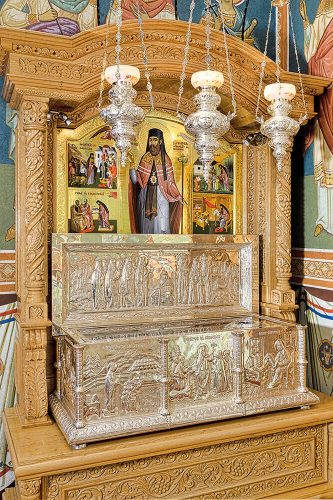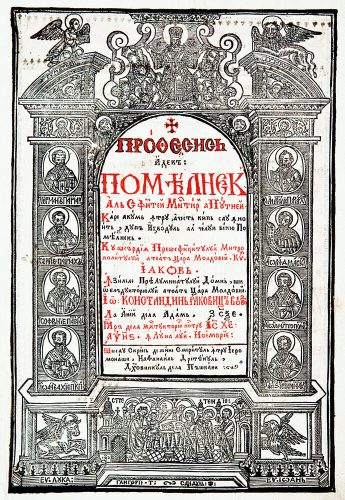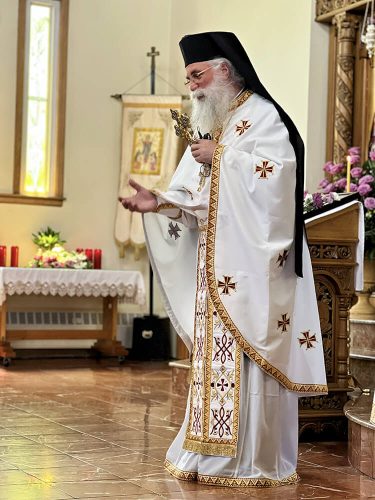By God’s grace, and through the goodwill of Father Abbot Melchisedec of Putna Monastery, our monastery was adorned with a portion of holy relics from Saint Jacob of Putna. Therefore, for one year, we will present fragments of the life of this great saint. Alongside these, we will present both his profitable words towards his flock, as well as some of the miracles performed after the uncovering of his holy relics.

Life of the Saint
Saint Jacob of Putna is a priceless gift which God gave to the Romanian people and to the Church. His holy life and works did not remain hidden under a bushel; rather, they make him a model of one who served God with all his heart and all his strength, through all the gifts with which the great hierarch was endowed.
Having entered the monastery during childhood, he became abbot of Putna, bishop of Rădăuți, metropolitan of Moldavia, and he illumined all through his love and sacrifice for the people, through his zeal for Christ and the Church, through his Christian dignity and fearlessness in defending the truth and the good.
Being humble and an intercessor for his nation, he knew to identify with the needs and pains of the people, becoming a father unto all, gracious, prayerful, and devoted. His prayers and activities were directed, first and foremost, toward the benefit of families, the upbringing and education of children, and mercy toward the poor and destitute. He founded many churches and monasteries, he printed the first primer for children in Moldavia, he oversaw the founding of the first rural school in Moldavia, as well as of the Saint Spyridon Hospital in Iași.
For Putna, he is the second greatest founder of the monastery and the father of the ascetic fathers both in the monastery proper and in its sketes – Hermitage of Putna, Hermitage of Ursoaia, and Old Monastery – during the 18th century. Around him, there had gathered fathers who, in time, formed others and bore along the message that Putna had from the beginning, from the Holy Voivode Stephen the Great: good conduct of life, love for truth, love for faith, love for everything beautiful and eternal.
Beginnings of monastic life. The Holy Metropolitan Jacob was born on January 20, 1719, to a pious family in northern Moldavia. Almost all his family members would embrace the monastic life: his parents were tonsured with the names Adrian and Mariana, his brother became the monk Joel, one of his sisters was the nun Pelagia, and another sister, Maria, married, yet her husband later became the hieromonk Mishael from the Doljești Skete.
Moved by zeal for Christ, at just 12 years old, he entered Putna Monastery. Here he encountered a true monastic school, with spiritual fathers who passed down the science of the life in Christ from one generation to the next. With humility, he dedicated himself in obedience and thus was formed as the spiritual father that his works and writings would later reveal.
At Putna, he was a disciple of Metropolitan Anthony, whom he considered his “elder”, his spiritual father. Thus, he inscribed himself in his elder’s spiritual lineage, which begins with Metropolitan Sabbas Balaci, in the first half of the 18th century, and continues through Bishop Calistru of Rădăuți, Metropolitan Anthony, and Saint Jacob. In the monastery’s Commemoration List, composed at the commandment of Saint Jacob in 1756, at the listing of Metropolitan Sabbas’s name, this lineage is noted thus: “Sava the Metropolitan: He tonsured bishop Calistru, and Calistru tonsured metropolitan Anthony, and Anthony tonsured metropolitan Jacob.”
In just a few years, he advanced spiritually so much that, in 1736, at 17 years old, he was ordained as hieromonk by Metropolitan Anthony.
After receiving the grace of priesthood, he continued his spiritual struggles with more zeal and deepened himself in humble thinking, in self-knowledge and in knowledge of God. Being nourished by the writings of the Holy Fathers, found in the monastery’s library, with the spiritual sustenance of prayer and being borne on the divine wings of obedience, Saint Jacob filled his soul with yearning for God and with zeal for the beauty of the life in Christ. The thought of obtaining union with God guided him his entire life, showing him which works have eternal value and which dissolve without any spiritual benefit.
His zeal for his monastery, his competence in administration, and the grace of God which rested in His humble servant showed the brotherhood that he is worthy to attend to the good governance of Putna. Therefore, he was elected abbot of the monastery in 1744, at 25 years old.
(To be continued)
Instruction to the fathers of Holy Putna Monastery
[…] And, being entrusted, also from this word from the great Basil, which says that water will quench the burning fire, and that bloodless oblation of the priests will deliver from sins, and that it will bestow mercy upon our spirit and life in that luminous day, we came to our senses and, as far as we were able, we made a resolute beginning and renewed the structures which had collapsed and deteriorated, of the holy and divine settlement of Holy Putna Monastery, not from the income and acquisitions of the Holy Metropolis, but from those which, from our childhood and until now, we gained through many struggles and with our own sweat. And with this perfect aim, also from now on, to the best of our ability we will beautify and renew this Holy Monastery until our final breath. And after our repose in the Lord, we bequeath to this august Putna Monastery all that we will have acquired through the gift of the bishopric and our own efforts.

First of all, this will be for the eternal memory of our humble soul and of our parents and for the remission of our many transgressions which we have committed and have surpassed all men with our dishonorable acts. Also, this is the monastery of our repentance and we are completely dedicated to this holy and divine settlement, together with the ranks of the venerable fathers and brethren who live here venerably.
So, with ardent and wholehearted prayer, we ask all you fathers and brethren whom Christ loves, both you who are current inhabitants of this holy monastery and also those who will be in ages to come, that, without laziness and rest, every day to commemorate, at all the perpetual prayers and oblations to God, first the names of all the blessed founders and the other faithful found on the old commemoration list, and which now we have written with all their names, as can be seen. And, after these, we ask you to pray also for our humble soul, which we have greatly dirtied and tainted with our uncomely acts, which in their multitude have engulfed the crown of our head, that the Lord maybe inclined to show gentleness and mercy upon us on the day of redemption.
Leave behind, my beloved brethren, the vanities of the world and give your heart into captivity to the ineffable blessings of the heavenly Kingdom. Humble yourselves in the Lord, so that He may glorify you in eternity. Remember our departed fathers and brethren continually, so that the Lord may also remember you at His second coming. The hardship is small, but the rest unending; the toil is little, but the reward immeasurable; the sorrow is little, but the rejoicing rich; the contests are small, but the crowns perpetually flowering. And, especially, all the toils are temporary, but the blessedness and joy ineffable and unending.
(Prothesis, or Commemoration List of Holy Putna Monastery)
Testimony: Saint Jacob, if you want, you can heal me…
Saint Jacob of Putna, the Metropolitan of love and mercy, the scholar who skillfully writes the mysteries of faith in the hearts of the faithful, did not delay in visiting his flock, in a humble, discreet, and natural way.
In the fall of 2014, one of the brethren of Putna Monastery, who was 20 years old, was admitted to the Floreasca Emergency Hospital in Bucharest with a venous complication in his right leg, which then provoked the development of an advanced trophic ulcer, a rare disease for such a young age, which caused much consternation even for the most experienced doctors. This diagnosis required an immediate surgical intervention, so the operation was performed. But the post-surgical complications did not delay in appearing: his right leg was weakened by hemiparesis. After prolonged recovery exercises, the leg regained its mobility, but the ulcer remained and often was quite bloody.
After about half a year, another surgery was attempted at the Suceava County Hospital. The trophic ulcer, which had reached an advanced stage, was stabilized, but its existence endangered the patient’s health even more, due to the destruction of the epidermic tissues on the lower leg.
Once the relics of Saint Jacob of Putna were uncovered, at the initiative and with the blessing of Father Abbot Archimandrite Melchisedec and of the local hierarch, His Eminence Pimen, the sick leg was touched to the holy relics and prayers were offered to the Saint. After just several days, the merciful and loving response of Saint Jacob touched the hearts of the entire brotherhood. The ulcer healed by itself, without any medical treatment, after a period of a year and a half of continuous existence. The Saint did not remain indifferent to the persistent prayer of Putna’s brotherhood: “Saint Jacob, if you want, you can heal our brother!”, this being a testimony to the protection and presence of the Saint amidst Putna’s brotherhood and amidst the faithful, until the present day.
Homily for the bringing of the relics of Saint Jacob of Putna to America
The Saints are the friends of God, they are those who beautify God’s house. Saint Jacob of Putna, during his entire tenure as Metropolitan of Moldavia from 1750–1760, would identify with the misfortunes, the joys, and the problems of his country. In that time, our nation was burdened by taxes upon taxes. In 1757, he succeeded in placing a curse so that none of the rulers of Moldavia could burden the people with taxes. Meanwhile, during the same period, he founded the first rural school, he oversaw the publishing of the first school primer, where in the foreword he wrote: “Education is like tree sap. If the education is good and healthy, then the children will also grow up to be good and of sound mind.” In 1760, he withdrew from the metropolitan throne of Moldavia. Theodore Callimachi rose to power and tried to force Metropolitan Jacob to lift the curse, but the Saint said: “Rather than lift the curse, I’d rather give up my position as metropolitan.” He retired to Putna Monastery, where his first care was directed to the miracle-working icon of the Mother of God, which he plated with silver. Then, he restored all the buildings.

But what made Saint Jacob grow closest to God? His boundless love, his enlarged heart, his unceasing prayer for which he strove. He wrote, among other things: “Prayer is like the sun, because wherever the sun shines its rays, life thrives.” When we forget to prayer, when we pray only formally, how do we become? Foreign. And we remain the same, without being transformed, without anything changing within us. But when we pray a little more attentively, then we see how the light penetrates within us. How beautiful prayer is, but also how neglected in our day! And what is prayer? It is the mind’s converse with God, and as Saint John of the Ladder says beautifully, it is the sustainer of the whole world. Therefore, my advice is this: to pray more, to love the beauty of God’s house, to make our heart into a house of God. How? By calling frequently upon the name Jesus. The Lord’s name comes with a certain power that sanctifies and deifies me. It enlarges my heart so that I can bring before God both those whom I love and those whom I don’t love, because the greatest thing is to love the wound and the one who caused it, as Elder Arsenie Papacioc would say.
Behold, Saint Jacob of Putna desired for a fragment of his right hand to come to you in America. So, my beloved, every time you have the chance, call out to him. Every time your children don’t want to listen to you, tell him, and he will know what to do. Every time there is an impasse in your family between husband and wife, cry before him, and he will resolve it. Saint Jacob of Putna was a protector of the family. He sacrificed himself for the families of his time, for the well-being of the families in Moldavia. And when he retired from his metropolitan throne, he did so also out of love for the family. Likewise, Saint Jacob of Putna urged parents to send their children to school. In our time, we are witnessing a decline in the level of education in absolutely all countries and all fields. The youth no longer love learning as it was loved, for example, in the inter-war period or even in the 70s, 80s, and 90s. Education is no longer loved. Well, Saint Jacob attended to the education of the children.
So, you will have here a comforter and a protector of the family. Pour out your hearts and cry before him. Christ is ascended!
Archimandrite Melchisedec Velnic
